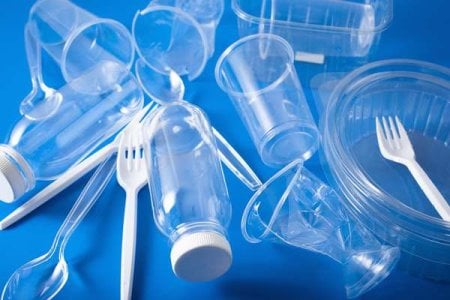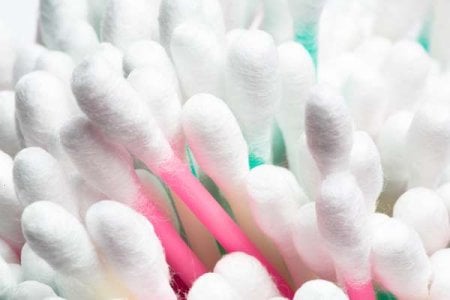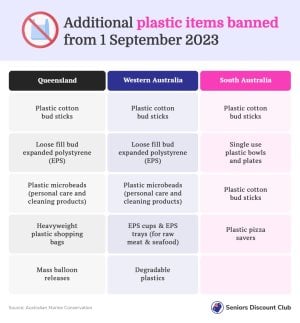Is your state affected? Plastic ban on takeaway containers and coffee cups are starting this month
Suppose you are one of those people who loves to sip on your favourite brew from a takeaway coffee cup or relishes the convenience of takeaway containers for hassle-free dinners.
In that case, this new development may require some adjustments on your part.
Last year, all states in Australia banned single-use plastic, but effective September 1, 2023, several states are expanding on that ban on certain single-use plastic items, including coffee cups and takeaway containers.
Queensland, South Australia, and Western Australia are taking bold steps to halt the onslaught of plastic waste.
Now, if you're thinking this only affects takeaway containers and our coffee cups, brace yourselves for the further plastic items we're saying goodbye to.
All three states prohibit the sale of cotton buds with plastic stems–a staple in most households. Queensland and Western Australia also ban polystyrene packing peanuts and microbeads found in personal care.
Single-use plastic plates, bowls, and pizza savers, which keep our boxed pizza toppings safe in transit, are now banned in South Australia.
Meanwhile, Western Australia prohibits degradable plastics and expanded polystyrene cups and trays for raw meats and seafood.
Moreover, Queensland outlaws 'lighter-than-air balloons' and adds further requirements for heavyweight plastic shopping bags.
You might think that the little plastic we use at home couldn't cause much harm, but the reality is quite the opposite. As Leanne Linnard, Queensland's Environment and the Great Barrier Reef Minister, explained, it's a 'growing problem'.
'We are working towards Queensland becoming a zero-waste society, where waste is avoided, reused, and recycled to the greatest extent possible and are delighted that the message about how vital it is to keep our environment free from plastic waste is reaching our community,' she said.
The green steps don't stop there.
Queensland has even adopted a Container Refund Scheme to motivate individuals to return eligible containers at a 10c reward per item.
‘Since this scheme started, more than 6.8 billion containers have been returned through over 360 refund points across Queensland with an additional 1.4 billion collected through kerbside services,’ Ms Linnard shared.
She added: ‘Single-use plastics bans and the Container Refund Scheme have combined to eliminate an enormous amount of plastic and container litter from entering our environment and landfills.’
New South Wales and Victoria have not announced plans to expand their bans on single-use plastic. On the other hand, Tasmania has no plans to ban single-use plastic.
Australian Marine Conservation (AMCS) Plastics Campaign Manager Shane Cucow stated, ‘These bans were made possible by thousands of ocean lovers who demanded politicians take action to stem the flow of plastic into our oceans, which is set to triple by 2040 if we don’t take decisive action.’
‘The piecemeal nature of the bans across the states shows the need for Australia’s states and territories to come together and agree on a roadmap to harmonise the bans. The roadmap needs to be ambitious and should include items regularly found in our oceans and highly likely to be ingested by wildlife such as thick plastic shopping bags, pre-packaged straws and cutlery, released balloons and expanded polystyrene,’ he claimed.
Here are the additional plastic items affected by the ban:
You may also check AMCS’s Ban on Single-Use Plastics scorecard here.
Come next year, Western Australia plans to extend their ban to cover produce bags, disposable plastic cup lids and coffee cups.
South Australia isn't staying behind either–from September next year, the list of banned items will have expanded considerably, including bread tags and plastic confetti, among other things.
The Australian Retailers Association (ARA) has voiced its support for these regulatory changes. Their recent survey discovered that three-quarters of respondents would support plastic bans ‘despite higher costs’.
ARA's Chief Executive Paul Zahra stated, 'Retailers have a strong track record of getting behind these changes.'
‘But we also need consumers to support this transition, and we need realistic policy settings from the government to make sure we can implement these bans at least cost and complexity for businesses,’ he added.

What do you think of this story, members? Do you support these bans? Let us know in the comments below!
In that case, this new development may require some adjustments on your part.
Last year, all states in Australia banned single-use plastic, but effective September 1, 2023, several states are expanding on that ban on certain single-use plastic items, including coffee cups and takeaway containers.
Queensland, South Australia, and Western Australia are taking bold steps to halt the onslaught of plastic waste.
Now, if you're thinking this only affects takeaway containers and our coffee cups, brace yourselves for the further plastic items we're saying goodbye to.
All three states prohibit the sale of cotton buds with plastic stems–a staple in most households. Queensland and Western Australia also ban polystyrene packing peanuts and microbeads found in personal care.
Single-use plastic plates, bowls, and pizza savers, which keep our boxed pizza toppings safe in transit, are now banned in South Australia.
Meanwhile, Western Australia prohibits degradable plastics and expanded polystyrene cups and trays for raw meats and seafood.
Moreover, Queensland outlaws 'lighter-than-air balloons' and adds further requirements for heavyweight plastic shopping bags.
You might think that the little plastic we use at home couldn't cause much harm, but the reality is quite the opposite. As Leanne Linnard, Queensland's Environment and the Great Barrier Reef Minister, explained, it's a 'growing problem'.
'We are working towards Queensland becoming a zero-waste society, where waste is avoided, reused, and recycled to the greatest extent possible and are delighted that the message about how vital it is to keep our environment free from plastic waste is reaching our community,' she said.
The green steps don't stop there.
Queensland has even adopted a Container Refund Scheme to motivate individuals to return eligible containers at a 10c reward per item.
‘Since this scheme started, more than 6.8 billion containers have been returned through over 360 refund points across Queensland with an additional 1.4 billion collected through kerbside services,’ Ms Linnard shared.
She added: ‘Single-use plastics bans and the Container Refund Scheme have combined to eliminate an enormous amount of plastic and container litter from entering our environment and landfills.’
New South Wales and Victoria have not announced plans to expand their bans on single-use plastic. On the other hand, Tasmania has no plans to ban single-use plastic.
Australian Marine Conservation (AMCS) Plastics Campaign Manager Shane Cucow stated, ‘These bans were made possible by thousands of ocean lovers who demanded politicians take action to stem the flow of plastic into our oceans, which is set to triple by 2040 if we don’t take decisive action.’
‘The piecemeal nature of the bans across the states shows the need for Australia’s states and territories to come together and agree on a roadmap to harmonise the bans. The roadmap needs to be ambitious and should include items regularly found in our oceans and highly likely to be ingested by wildlife such as thick plastic shopping bags, pre-packaged straws and cutlery, released balloons and expanded polystyrene,’ he claimed.
Here are the additional plastic items affected by the ban:
You may also check AMCS’s Ban on Single-Use Plastics scorecard here.
Come next year, Western Australia plans to extend their ban to cover produce bags, disposable plastic cup lids and coffee cups.
South Australia isn't staying behind either–from September next year, the list of banned items will have expanded considerably, including bread tags and plastic confetti, among other things.
The Australian Retailers Association (ARA) has voiced its support for these regulatory changes. Their recent survey discovered that three-quarters of respondents would support plastic bans ‘despite higher costs’.
ARA's Chief Executive Paul Zahra stated, 'Retailers have a strong track record of getting behind these changes.'
‘But we also need consumers to support this transition, and we need realistic policy settings from the government to make sure we can implement these bans at least cost and complexity for businesses,’ he added.
Key Takeaways
- Several Australian states, including Queensland, South Australia and Western Australia, have implemented further bans on single-use plastic items as of 1st September.
- The bans cover plastic coffee cups, takeaway containers, packing peanuts, cotton buds with plastic stems, and certain plastic shopping bags.
- Queensland has also launched a Container Refund Scheme, rewarding people with 10c for returning eligible containers at refund points.
- New South Wales and Victoria have yet to announce plans to expand their bans on single-use plastic. Tasmania, on the other hand, has no plans to ban single-use plastic.
- The Australian Retailers Association supports the ban, with a survey revealing three-quarters of respondents favour plastic bans despite potentially higher costs.
What do you think of this story, members? Do you support these bans? Let us know in the comments below!










